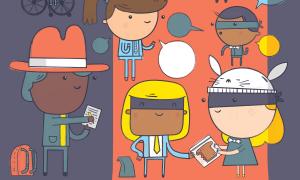December 13, 2017
3,873 Results
article
Secret Agents of Kindness

A teacher gave students a simple task: Be kind, but selfless. The results illustrate the contagious effects of humanity.
page
Teaching Hard History Podcast Series
Host Hasan Kwame Jeffries, Ph.D., brings us the hard history of the United States from slavery through the Jim Crow era and the Civil Rights Movement — with relevance to today’s issues.
January 30, 2018
text
Literature
A Room of One's Own
In this excerpt, Virginia Woolf declares that any talented woman born in the 16th, 17th, 18th or even 19th centuries would have been so hindered from sharing her gifts due to her sex--and if she somehow overcame this obstacle, her name would not have been tied to her work.
July 7, 2014
publication
article
Students Write for Audiences Close to Home
Hands jut into the crisp autumn air, restricting my field of vision to a sea of shirtsleeves. While this is not an odd phenomenon after a new writing assignment, the types of questions are. “When will we mail it?” and “Can I make this longer than three paragraphs?” replace heavy sighs of “When is this due, again?”
article
Guideposts for Equity
An educator reflects on her commitment to building a just and equitable society.
article
Testing, Testing: How Mindfulness Can Help

If your students haven’t already begun testing, we know it’s right around the corner. This mindfulness practitioner suggests some ways to relieve students’ test-related stress.
article
Teaching Students to See Each Other
This English teacher’s students engage in lots of self-reflection toward the end of the year. This year, she added in a missing element: questions about how they’ve affected each other.
text
Informational
To Fulfill These Rights
Lyndon B. Johnson delivered this commencement address to Howard University graduating students in 1965. Johnson recognizes the plight of African Americans and describes the kind of civil rights progress he would like to see as president.
July 7, 2014